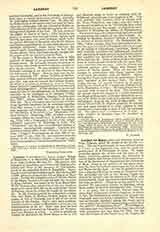

Lambert Le Begue , priest and reformer, lived at Liege, Belgium, about the middle of the twelfth century. The son of poor people, he was ordained priest in a more or less legitimate way, and was probably parish-priest of St-Christophe at Liege. He began preaching against the abuses and the vices of the clergy, protesting against simony, the ordination of sons of priests, and certain customs in the administration of the Sacrament of Baptism and the celebration of Mass. Some of his opinions are not above suspicion, his ideas for instance concerning the day of rest, and Masses for the dead. In time he gathered about him a popular following, for whom he translated into the vernacular the Life of the Blessed Virgin, the Acts of the Apostles, and the Epistles of St. Paul, with commentaries; these translations unfortunately have not been preserved. Probably at this period he organized the association known as Beguines, whose name cannot be derived philologically from “to beg” (i.e. to pray), but is probably derived from the name begue (stammerer) given to Lambert, to whom, in fact, the foundation is attributed by several contemporary and trustworthy authorities. But he also had adversaries, especially among the clergy, and it was to refute them that he wrote a defense of his theories, entitled “Antigraphum Petri”. His writings reveal him a man very learned for his time; they abound with quotations, not only from the Bible, but also from the Fathers of the Church (e.g. St. Gregory, St. Augustine, and St. Bernard), and even from profane authors like Ovid, Virgil, and Cicero. Accused of heresy, he was condemned and imprisoned notwithstanding his appeal to the Holy See. He succeeded in making his escape and went over to the Antipope Callistus III, who had been recognized by Raoul of Zahringen, Prince-Bishop of Liege. He wrote to the pope several letters in justification of his doctrines and conduct, but the result of these endeavors is not known. In all probability he returned to Liege and died there in 1177.
M. A. FAYEN

